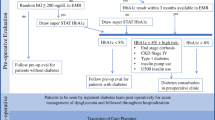Abstract
Background
Bariatric surgery is a recommended treatment for diabetes in severely obese patients. Their immediate post-operative anti-hyperglycemic requirements differ from other hospitalized diabetics, yet no standardized protocols addressing glycemic control for this group exist.
Objective
We aimed to create a safe, easily implemented protocol for immediate post-operative glycemic control, which we defined as the first 30 days.
Methods
The protocol was designed by an interdisciplinary workgroup using review of available literature, approved institutional glycemic guidelines, and team members’ experience with caring for bariatric surgery patients.
Results
Patients are offered post-discharge recommendations using the inpatient glycemic protocol.
Conclusion
We designed a protocol with low risk of hypoglycemia that addresses the unique glycemic needs of diabetic bariatric population in the immediate post-operative period.
Similar content being viewed by others
References
National Diabetes Fact Sheet. Centers for Disease Control and Prevention Web site. http://www.cdc.gov/diabetes/pubs/pdf/ndfs_2011.pdf. Published 2011. Accessed April 1, 2014
Ng M, Fleming T, Robinson M, et al. Global, regional, and national prevalence of overweight and obesity in children and adults during 1980–2013: a systematic analysis for the Global Burden of Disease Study 2013. Lancet. 2014;384:766–81.
American Diabetes Association. Standards of medical care in diabetes—2014. Diabetes Care. 2014;37:S14–80.
Lee CJ, Clark JM, Schweitzer M. Prevalence of and risk factors for hypoglycemic symptoms after gastric bypass and sleeve gastrectomy. Obesity. 2015;23(5):1079–84.
Heber D, Greenway FL, Kaplan LM, et al. Endocrine and nutritional management of the post-bariatric surgery patient: an Endocrine Society Clinical Practice Guideline. J Clin Endocrinol Metab. 2010;95:4823–43.
Christou NV, Sampalis JS, Liberman M, et al. Surgery decreases long-term mortality, morbidity, and health care use in morbidly obese patients. Ann Surg. 2004;240:416–23.
Sjostrom L, Narbro K, Sjostrom CD, et al. Effects of bariatric surgery on mortality in Swedish obese subjects. N Engl J Med. 2007;357:741–52.
Buchwald H, Avidor Y, Braunwald E, et al. Bariatric surgery: a systematic review and meta-analysis. JAMA. 2004;292:1724–37.
Schauer PR, Bhatt DL, Kirwan JP, et al. Bariatric surgery versus intensive medical therapy for diabetes—3-year outcomes. N Engl J Med. 2014;370:2002–13.
Dixon JB, le Roux CW, Rubino F, et al. Bariatric surgery for type 2 diabetes. Lancet. 2012;379:2300–11.
Ardestani A, Rhoads D, Tavakkoli A. Insulin cessation and diabetes remission after bariatric surgery in adults with insulin-treated type 2 diabetes. Diabetes Care. 2015;38:659–64.
Service GJ, Thompson GB, Service FJ, et al. Hyperinsulinemic hypoglycemia with nesidioblastosis after gastric-bypass surgery. N Engl J Med. 2005;353:249–54.
Ritz P, Hanaire H. Post-bypass hypoglycemia: a review of current findings. Diabetes Metab. 2011;37:274.
Korner J, Bessler M, Inabnet W, et al. Exaggerated glucagon-like peptide-1 and blunted glucose-dependent insulinotropic peptide secretion are associated with Roux-en-Y gastric bypass but not adjustable gastric banding. Surg Obes Relat Dis. 2007;3:597–601.
Spanakis E, Gragnoli C. Successful medical management of status post-Roux-en-Y-gastric-bypass hyperinsulinemic hypoglycemia. Obes Surg. 2009;19:1333.
Fenske WK, Pournaras DJ, Aasheim ET, et al. Can a protocol for glycemic control improve type 2 diabetes outcomes after gastric bypass? Obes Surg. 2012;22:90–6.
Umpierrez G, Smiley D, Hermayer K, et al. Randomized study comparing a basal-bolus with a basal plus correction insulin regimen for the hospital management of medical and surgical patients with type 2 diabetes. Diabetes Care. 2011;34:256–61.
Mechanick JI, Youdim A, Jones DB, et al. Clinical practice guidelines for the perioperative nutritional, metabolic and nonsurgical support of the bariatric surgery patient—2013 update: cosponsored by American Association of Clinical Endocrinologists, the Obesity Society, and American Society for Metabolic & Bariatric Surgery. Obesity. 2013;1:S1–S27.
Rothkopf MM, Bilof ML, Haverstick LP, et al. Synergistic weight loss and diabetes resolution with exenatide administration after laparoscopic gastric banding. Surg Obes Relat Dis. 2009;5:128–31.
Chuah LL, le Roux CW. Management of patients with type 2 diabetes before and after bariatric surgery: evolution and microvascular complications. Nutr Hosp. 2013;28:17–22.
Conflict of Interest
The authors declare that they have no conflict of interests.
Ethical Approval
This article does not contain any studies with human participants or animals performed by any of the authors.
Informed Consent
Informed consent is not applicable in this study.
Author information
Authors and Affiliations
Corresponding author
Rights and permissions
About this article
Cite this article
Machnica, K., Pannain, S., Schulwolf, E. et al. Inpatient Glycemic Protocol for Patients with Diabetes Undergoing Bariatric Surgery. OBES SURG 25, 2200–2204 (2015). https://doi.org/10.1007/s11695-015-1860-y
Published:
Issue Date:
DOI: https://doi.org/10.1007/s11695-015-1860-y



